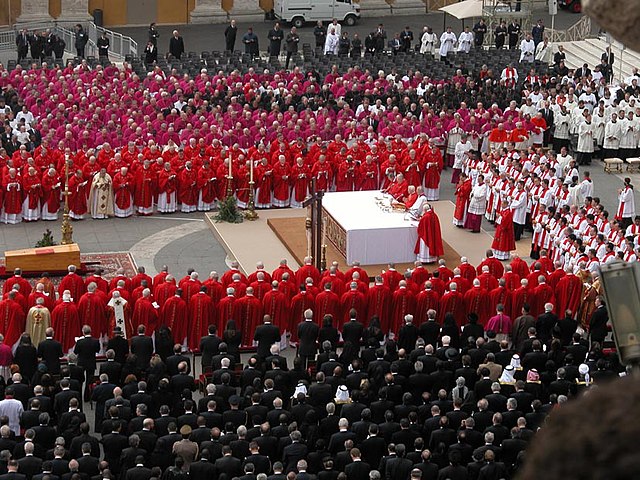**spoilers ahead**
The Pope is dead.
If you, like most people (myself not included), haven’t been anxiously awaiting the release of Edward Berger’s “Conclave” (2024), this is your sign to watch it. The drama takes place after the death of the Pope, during the conclave –– the private assembly of cardinals electing his successor.
“Conclave” opens with the slow, deliberate fulfillment of the rites of the Roman Catholic Church –– cardinals pray over the Pope’s body, ceremonially remove and destroy the papal ring and seal off the Pope’s apartment. After the postmortem procedure, over 100 cardinals pour into Vatican City from all over the world, cigarette butts on the courtyard floor piling up by the minute.
At its core, the film is a story of doubt. Ralph Fiennes’ Cardinal Thomas Lawrence, the dean of the conclave, spends the film mired in his own doubts, of his own faith and ostensibly, the Church and its leadership – the catty, self-serving cardinals who have for the most part either partisan or selfish motives. Lawrence is left to navigate the treacherous landscape of shifting alliances, buried secrets, and unchecked ambition not-so-cleverly disguised as faith. As with all promises of great power, the most ambitious contenders are those least likely to use it well.
Stories of doubt and subsequent faith are scattered throughout the Bible. “Conclave” calls to mind that of the apostle Thomas, from whom the phrase “Doubting Thomas” comes. In the biblical account, Thomas is absent when Jesus returns from the dead, and declares that unless he sees the wounds from the crucifixion nails in Jesus’s hands, and can “thrust [his] hand” into the wounds in Jesus’s side, he will not believe.
In “Conclave,” Cardinal Lawrence is a textbook Doubting Thomas –– the skeptic’s skeptic (and only partially because of his conveniently apt name). While the biblical episode depicts Jesus present to offer Thomas proof, in “Conclave,” of course, the Pope is long dead, leaving behind mystery after mystery. There are reports that one cardinal’s final private meeting with the Pope before his death ended with a request for the cardinal’s resignation. The only person who could confirm the story is, of course, dead. An extra cardinal shows up in Vatican City for the conclave –– purporting to have been appointed by the Pope in pectore, without public knowledge.
In his opening remarks for the conclave, Lawrence says, “There was one sin which I had come to fear above all others. Certainty.” Noble, and yet, Lawrence is entirely unable to take his own advice.
Lawrence is questioning constantly, pulling the one proverbial thread that unravels the whole sweater.
The conclave is sequestered –– the outside world is shut out. Monsignor O’Malley, Lawrence’s assistant, is the only link Lawrence has to the outside world, and he’s conflicted about whether to take advantage of it. Despite his claim that he wants to fulfill the cloistered ideal of the conclave, Lawrence’s questioning ultimately extends beyond secret meetings in shadowy stairwells and heated confrontations with suspicious cardinals, sending O’Malley to do his extracurricular investigations. The rabbit hole is irresistible.
Lawrence is lovable enough, and the story is enticing enough that we as viewers get wrapped up in the chase. And yet, Ralph Fiennes’ performance evokes something so fatalistic: no matter how pure his intentions might have been at the outset, his limitless descent into the other cardinals’ deepest secrets draws him into the conspiracies and power struggles of the conclave. Watching the decent, unimpeachable cardinal slowly become embedded into the inescapable mire is hard to watch.
There’s a moment when Lawrence is wearing all black, blending completely into the small black chair he’s sitting in, and the framing of the shot cramps him even further into the small room he’s in. It’s startling to see the determined cardinal suddenly look so small.
“Conclave” navigates well the constantly evolving tensions between doubt and faith, especially in light of the cardinals’ distortion of faith to meet personal ends. The extent to which the film examines how we indulge and value doubt goes beyond the gossipy intrigue of the political thriller. Maybe I’m betraying a soft spot for anyone questioning their faith, but the film’s ability to balance both maximizing the tantalizing drama and leaving space for Lawrence’s very authentic slide into irreparable doubt and his consequent guilt is incredibly gratifying.
That the Pope takes his secrets with him, with no easy road to clarity or closure, is perhaps in some way what this Church leadership deserves –– what gets buried will be dug up.
Whether or not Thomas actually reaches his hand into Jesus’ wounds is unstated in the biblical account in the Gospel of John. And yet, the doubting Thomas of “Conclave” does, in fact, break the seal on the Pope’s apartment, reach into the torn headboard on the Pope’s bed, and find the evidence of an ambitious cardinal’s simony –– and that’s just what the Church needs.
Contact the editors responsible for this article: Norah Catlin, Ivy Buck



